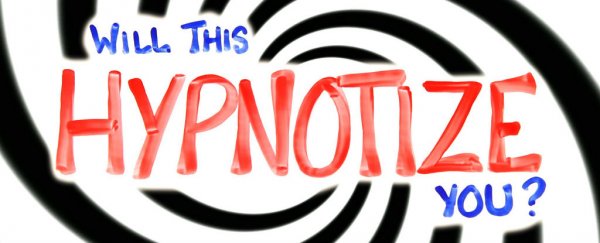
While most of us associate hypnotism with entertainment and various forms of therapy, scientific researchers describe hypnotism differently: a state of consciousness involving highly focussed attention, minimising competing thoughts, and allowing an enhanced ability to respond to suggestions. Forget falling into a dream-like state and acting like a chicken - hypnotism, from a scientific perspective, is about achieving the kind of focus you experience when reading a book or watching TV, says AsapSCIENCE.
When we're engrossed in a book or an amazing television show, our focus becomes so narrow, the world seems to 'slip away'. In this state, our minds are even capable of shutting down our autonomic responses - a control system that regulates bodily functions such as the heart rate, digestion, respiratory rate, pupillary response, urination, and sexual arousal, mostly without you even noticing it.
An example of an autonomic process in action is the Stroop effect - when you're presented with the name of a colour written in a completely different colour. Think "green" written in blue. As simple as it is to identify and name a simple colour, it's surprising difficult when your brain has to compete with a word it also wants to interpret at the same time. Watch the video above to give it a try.
"It's difficult because our autonomic process of wanting to read the word trips us up in our ability to name the colour quickly," says Mitch from AsapSCIENCE. "However, if the words were in another language like Dutch, then you would have no problem naming the colours, as the words don't have meaning to you… unless you speak Dutch."
So what happens when hypnotised patients are made to perform the Stroop test? In the video, they describe an experiment where people were hypnotised to think the names of colours were gibberish, and this temporarily eliminated the Stroop effect. It was like the words were a completely foreign language to them.
When the researchers observed the activity of the participants' brains in an fMRI machine, they saw decreased activation in the anterior cingulate cortex - an area in the brain involved in resolving conflict and competing demands. They also saw decreased activity in the visual cortex that's crucial for recognising written words. And being able to switch off this autonomic response can be a super handy tool for neuroscientists to better understand how it works.
The problem is that hypnosis doesn't effect everyone equally, which sucks if you're not very susceptible and want to take advantage of the fact that hypnosis can actually modulate your phyical pain. How is that possible? I'll let the boys from AsapSCIENCE explain that in the video above, as well as what happens in the brains of people who are faking it. Which is pretty handy if you want to separate the effective hypnotists from the not-so-great hypnotists.
